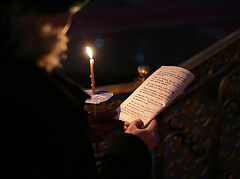 Artist Ivan Kramskoi. Christ in the Desert. Photo: Wikipedia
Artist Ivan Kramskoi. Christ in the Desert. Photo: Wikipedia
As the Lord overcame the enemy by fasting,
so by fasting let us also break in pieces his arrows and his snares.
(Tuesday of the First Week, Matins Canon, Ode 9)
The Divine Ascetic,1 Jesus Christ Himself, by fasting commenced the great work of our salvation; by fasting He entered the field of the saving labors of our redemption; by fasting He gained the first victory over the devil, overcoming the three strongest and, together, the most daring temptations from him.
The tempter, wearied by the forty-day fast of the Divine Ascetic, tempted the Faster first of all to immediately satisfy the hunger that tormented Him by the flattering suggestion to turn stones into bread. But he was repelled by the word of God that a man in the midst of bodily hunger can support his life with the word of God.
Then, having placed the Ascetic on the pinnacle of the Temple, the tempter urged Him to throw Himself down, with confidence that the angels would take Him up in their arms and place Him safely on the ground. And again he was repelled by the word of God: Thou shalt not tempt the Lord thy God (Mt. 4:7); that is, the word of God forbids unnecessarily expecting supernatural help from God.
Finally, the tempter, in the blink of an eye, showed the Divine Warrior all the kingdoms of the earth, promising to give Him all their glory if He would fall down and worship him, thinking that by humiliation he would arouse the Ascetic to reveal His unknown power. But he was mightily repelled by the power of the spirit: Get thee hence, Satan: for it is written, Thou shalt worship the Lord thy God, and Him only shalt thou serve (Mt. 4:10, Lk. 4:8). All these temptations were overcome by the Savior after a forty-day fast, by the word of God in deep humility; He overcame them as man, without showing any sign of the Divinity in Him, for the reinforcement of tempted mankind.
If our Lord Himself fasted (Mt. 4:2) for forty days and forty nights, He fasted as perfect man, as a testimony to the primeval perfection of the humanity He received; He fasted as our Redeemer, for the purification of our nature, to give us an image, to do for Him what He did for us—then how can we not fast, who are sensual, carnal, corporeal, often lacking spirit in our lives and deeds?
The Lord Jesus spent the entire time of His forty-day fast in the wilderness, in deep stillness and solitude. Let us learn by fasting at least from the city squares and marketplaces, to find solitude in our homes; let us collect ourselves, at least from obvious distractions, from sensory entertainments, at least from explicit disharmony, and remove and calm ourselves from open contradictions. The Lord Jesus, as the second Adam, expiated the intemperance of our first Forefather Adam, and gave us an example of how to overcome, to the utmost, even the most necessary natural needs by abstinence.
By fasting as much as we can we will curb, we will cut off at least the basest demands of our pleasure-seeking and sensuality; let us at least cast off the onerous weight of the flesh to raise up the spirit, which has been weighed down. Through the labor of fasting, the Lord Jesus overcame the most subtle temptations of the evil spirit. So by fasting as much as we can, we too cut off from ourselves at least the perceptible passions, with which, constantly tempting and entangling us like nets, our enemy enthralls us as his prey, and betrays us into slavery to flesh and blood, into the captivity of corruption and death.
The Lord Jesus, fasting physically as man, was inwardly fed by the words coming from the mouth of God. Let us learn by fasting to listen to the word of God with due attention and edification; let us learn to patiently, meekly, humbly, and judiciously listen to the words coming from human lips. The Lord Jesus combined external fasting with contemplation of Divine truths and unceasing prayer to God in the spirit. Let us learn by fasting to properly externally pray, and let us lay at least the first foundations for learning inner, noetic prayer.
When all the temptations of the devil were smashed by the Savior, then the devil left Him, and the angels came and began to minister to Him (Mt. 4:11). If, by the grace of God, we also repel at least the most open, carnal, sensual attacks of the evil spirit against us by fasting, then we will become more accessible to the spiritual world, and we will facilitate the unseen action of the angels upon us. And if amidst unremitting Lenten labors we strengthen ourselves by the power of Christ in overcoming the subtle temptations of the impure spirit, the temptations of self-love, self-delusion, and self-indulgence, then the Lord will send us angels as well.
Beloved ones! The holy forty days of Great Lent were established by the holy Church in reverent remembrance and holy imitation of the labors of the forty-day fast of our Savior. Let us traverse the holy path of the Fast as the path of blessed purification for souls and bodies, having before our eyes on the one hand our great sinfulness and impurity , and the labors and endeavors of our Divine Ascetic on the other.
Though quietly, slowly, from afar, if we follow in the footsteps of the Divine Cross-bearer, on His narrow and sorrowful path, if we follow after Him like Peter weeping, like the women weeping and lamenting, if we follow after Him in contrition for our sins, if we go without leaving Him, ever fixing our gaze upon Him, then we believe that we will go easily with Jesus, and with the help of Jesus, we will go not in vain, and not without fruit.
But let us first follow Jesus into the wilderness; let us zealously gather ourselves into silence, solitude, collectedness, so as to better see the dark region of our sins and transgressions. And amidst contrition, amidst tears and sighs, by the path of purifying Lenten labors, let us follow Jesus to the garden of His Gethsemane labors, where he not only grieved and mourned, but prayed for us with a great cry and with tears. How necessary it is for us to grieve with pain of heart, to mourn, to weep with Jesus for the sake of Jesus, for the cleansing of the multitude of our sins and transgressions! And it’s necessary, salvific, and sweet to grieve both with Jesus and for the sake of Jesus.
Let us cry out to Jesus with both mouth and heart in the strength of contrition, that He might lead us by His grace along the path of the holy Fast to the purification of our souls and bodies, that He might grant us both the holy desire and strength to hunger and thirst, to lament and mourn, and to be deprived and to suffer for His sake and for the sake of His righteousness. For true is the word that if we, by the grace of Christ, are accounted worthy to participate at least a little in His sufferings, then we will be accounted worthy, by His grace, to be partakers also of the glory of His Resurrection.
Amen.



